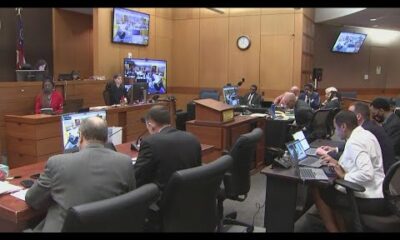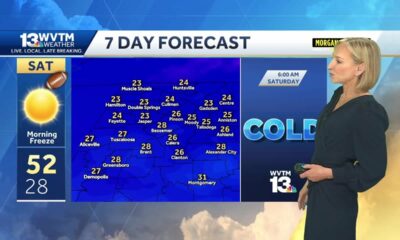Mississippi Today
Citing lack of body, defense casts doubt on Jimmie ‘Jay ‘ Lee’s death

OXFORD – Jimmie “Jay” Lee disappeared on his mother’s birthday.
Every year, Lee would call his mother, Stephanie, to sing “Happy Birthday.” On July 8, 2022, he texted her around 2 a.m. But the 20-year-old never responded after that. Not to Stephanie’s texts. Or to her 92 missed calls.
That’s because just a few hours later, Lee was allegedly killed by Sheldon Timothy Herrington Jr., a fellow student at the University of Mississippi with whom Lee had a secret relationship, the prosecution argued in their opening statement in Herrington’s capital murder trial on Tuesday at the Lafayette County Courthouse.
Lee had gone back to Herrington’s apartment at Herrington’s behest after the two had fought about sex, the prosecution said. Lee was a well-known member of Oxford’s LGBTQ+ community, but Herrington, whose family leads a prominent church in his hometown of Grenada, was not.
“He invited Jay back over with the promise that he was gonna do something he’d never done,” said Gwen Agho, a special prosecutor from Hinds County who joined the case to assist Lafayette County District Attorney Ben Creekmore.
But after 22,000 pages of evidence, 71 search warrants and seven law enforcement agencies, there is no direct evidence to show that Lee is dead, argued state Rep. Kevin Horan in his opening statements defending Herrington.
There is no body, no DNA, no blood and no urine, Horan said. Last week, he successfully moved to exclude evidence from K9 dogs from the DeSoto County Sheriff’s Department that “alerted” to the smell of a dead body in Herrington’s apartment and car after questioning its validity.
Horan also sought to cast doubt on evidence on what may be the strongest piece of circumstantial evidence the prosecution has to offer: A Google search that Herrington allegedly made while Lee was on his way over that reads “how long does it take to strangle someone.”
The search could have been about sexual activity with anyone, not just Lee, Horan said.
“I submit to you, ladies and gentlemen, that at the conclusion of this case, you’re going to have just as many questions then as you have now about whether or not they’ve proven a death,” Horan told the jury.
In fact, Horan said the evidence will show that it was actually Lee who threatened Herrington, because Lee sent a message before heading over telling Herrington “if this goes bad, it’s not gonna be good for you.”
If convicted, Herrington faces the death penalty or life in prison without the possibility of parole.
“You can’t go on objection, you can’t go on speculation, you can’t go on suspicion,” Horan told the jury. “Guesswork. Wonderment. All of those things you can’t do.”
The opening of trial came after jurors arrived late Monday night from Hattiesburg. Two years after Lee went missing, it was sparsely attended. Few sat behind Herrington, who never turned to face the gallery.
But Lee’s family and close friends seem just as committed to justice. Lee’s friends were the first members of the public to enter the courtroom shortly after 8 a.m. Some members of Lee’s family wore shirts with his picture on it.
They were instructed by Judge Kelly Luther to avoid emotional outbursts during testimony. Tissues boxes were placed in front of where Lee’s family sat. The attorneys were also told to keep their cool.
“I anticipate a hotly contested case,” Luther said before proceedings started.
The jury was comprised of eight women and seven men chosen from Forrest County. Eleven were white and four were Black.
During the selection process in Hattiesburg, potential jurors were asked if they had any problem with proof of death because Lee’s body has not been found, and none raised a hand. They were also asked if they knew any members of the LGBTQ community, or if they didn’t want to be exposed to information about a relationship between two men.
In his opening statement, Horan noted the case was touchy, due to Lee and Herrington’s sexual relationship and the emotions of Lee’s mother, who was the state’s first witness on Tuesday.
“The court is gonna instruct you at the conclusion of this case that you cannot allow your sympathy for a mother to come into play here,” Horan told the jury. “Y’all have got to decide this case on the facts.”
Horan also said that the jury will see no evidence to support Herrington’s underlying offense of kidnapping.
“If that didn’t happen, the rest of their case goes like a house of cards,” he said.
Aside from the Google search, Agho did not address the way Herrington allegedly killed Lee in her opening statement.
Instead, she emphasized all the details that police have gathered to prove Lee is no longer living. When Lee’s friend stopped by his apartment at Stephanie’s request, the door was ajar. Lee’s dog was inside. So were his valuables and his clothes.
That fall, Lee was slated to enroll in a master’s degree in social work at Ole Miss, but he never showed up for class. In the two years since he went missing, there have been no more credit card charges under his name, and no more social media posts.
“No more anything,” Agho said. “The plans for grad school? Moot. … All proof that Jay’s no longer with us.”
In November, a Lafayette County judge declared Lee dead, at the request by his parents for a legal declaration of death.
When Stephanie Lee testified, she said the last day she saw her son was on July 7 before he headed back to Oxford after spending the holiday at home in Jackson, according to her testimony.
“What was the last thing you ever heard from your son?” Agho asked.
“It’s your birthday,” she replied.
Justice Reporter Mina Corpuz contributed to this report.
This article first appeared on Mississippi Today and is republished here under a Creative Commons license.![]()
Mississippi Today
A century later, Hattiesburg High plays for a second state title

Anyone who has read this column regularly through the years knows my love of history, Mississippi sports history in particular. That passion only increases when it involves my hometown, Hattiesburg.
This Saturday night, the undefeated Hattiesburg High Tigers will play Grenada for the State Class 6A Championship. Should Hattiesburg win, it would mark the school’s first state football championship in precisely 100 years. That’s right: On Dec. 5, 1924, undefeated Hattiesburg defeated Louisville 20-14 at Laurel for the state championship.

Hattiesburg High has won several state championships in other sports, but the 1924 championship remains the school’s only state football crown. And boy oh boy, is there some history there.
Let’s start with this: Hattiesburg businessmen chartered a 12-car train from Southern Railway for the 30-mile trip to Laurel. What’s more, they had the cars decorated in school colors, purple and gold. According to reports in the next day’s Hattiesburg American, more than 3,000 Hattiesburgers — nearly 1,000 on the train — made the trip, especially impressive since the entire town’s population was then just over 13,000 in the 1920 census.
More than 5,000 fans in all attended the championship game, at the time the second largest crowd to attend a sporting event in Mississippi history, second only to an Ole Miss-Mississippi State football game at the State Fairgrounds in Jackson.
Since there were no stadium lights back then, the state championship game was played in the afternoon. When the victorious Tigers and their huge following arrived back in the Hub City at 6:47 p.m. they were greeted by all the town’s industrial whistles and police and ambulance sirens. Hattiesburg telephone operators reported nearly 2,000 calls from alarmed residents wondering what in the world had happened to cause such a ruckus. A parade led by the mayor through downtown Hattiesburg drew a larger crowd than the parade that celebrated the end of World War I, the Hattiesburg American reported.
“The Tigers of Hattiesburg were in possession of the city,” the American reported the next day. “The sweet taste of victory sent the crowd of more than 3,000 into a riot of cheering … This kept up until late in the evening.”

So much history: Two of the Tigers heroes that night were brothers Gerald “Gee” and Harvey “Hubby” Walker, who would go on to become football and baseball stars at Ole Miss and then on to play Major League Baseball. Gee Walker was an American League All-Star who batted .353 in 1936 and remains the only player in Major League history to hit for the cycle (home run, triple, double and single) on Opening Day, which he did, in that order, in 1937 with the Detroit Tigers.

For the Hattiesburg state champs of 2024, Gee Walker caught the passes that his brother Hubby threw. Hansel Batten, a sturdy, handsome youngster, was the Hattiesburg running star who scored two touchdowns, including the game-winner. Batten would go on to star at Ole Miss, where he was teammates again with the Walker brothers. Batten played both running back and linebacker and captained the Ole Miss football team. After that, his story takes huge turn.
Batten would become the sports editor and sometimes news reporter of the Hattiesburg American, often writing about the sport he once played so well. Tragically, in 1932, Batten was the victim of an apparent murder. Tom and Venie Jones, a husband and wife, were charged with the crime. The husband was convicted and sentenced to life in prison, but later granted a new trial and acquitted. The wife was acquitted after a series of trials. The story of Batten’s mysterious death and the trials that followed is covered in a fascinating podcast series “Reckless on the Rails” by Ellisville journalist/historian William T. Browning that can be accessed here. I highly recommend.
A much happier story is that the modern day Hattiesburg High Tigers, coached by Tony Vance and quarterbacked by his son Deuce Vance, will play for a second state championship 100 years after the historic first. Former Mississippi State standout Michael Fair coaches Grenada, which enters the championship game with a 14-1 record. Kickoff is set for 7 p.m. Saturday night.
It should be a terrific game. One thing is certain, should Hattiesburg (13-0) win, the Hub City will have a hard time topping the historic celebration that occurred 100 years ago this week.
Columnist Rick Cleveland is a 1970 graduate of Hattiesburg High and a former sports editor of the Hattiesburg American. His father, Robert “Ace” Cleveland, was sports editor of the Hattiesburg American when Rick was born. Ace Cleveland, a four-sport letterman at Hattiesburg High, earned his nickname when the Hattiesburg American referred to him as Hattiesburg High’s “ace placekicker.” It stuck.
This article first appeared on Mississippi Today and is republished here under a Creative Commons license.![]()
Mississippi Today
On this day in 1967


Dec. 4, 1967

Martin Luther King, Jr. announced creation of the Southern Christian Leadership Conference’s Poor People’s Campaign, a movement to broadly address economic inequalities with nonviolent direct action.
“It must not be just Black people,” argued King, “it must be all poor people. We must include American Indians, Puerto Ricans, Mexicans and even poor whites.”
The idea for the push came from Marian Wright Edelman, who had recently taken U.S. Senator Robert F. Kennedy to witness poverty firsthand in the Mississippi Delta.
When she shared the idea that Washington officials should meet the nation’s most impoverished citizens, King embraced the vision, telling reporters, “We will go there, we will demand to be heard, and we will stay until America responds. If this means forcible repression of our movement, we will confront it, for we have done this before. If this means scorn or ridicule, we embrace it, for that is what America’s poor now receive. If it means jail, we accept it willingly, for the millions of poor already are imprisoned by exploitation and discrimination. … In short, we will be petitioning our government for specific reforms and we intend to build militant, nonviolent actions until that government moves against poverty.”
King talked of a debt that the nation owed Black Americans, who were set free in 1863, “yet they were not given any land to make that freedom meaningful.”
He compared it to an imprisoned man whom authorities learn is innocent, “then going up to the man saying, now you are free. And you don’t give him any bus fare to get to town. You don’t give him any clothes to put on his back. You don’t give him any money to get on his feet in life again. The whole code of jurisprudence would rise up against this and yet, this is what America did to the Black man.”
King didn’t live to see this dream through, assassinated five months later.
This article first appeared on Mississippi Today and is republished here under a Creative Commons license.![]()
Mississippi Today
Mississippi could suffer the most if health insurance subsidies lapse

A new report warns Mississippi could see the steepest drop off in health insurance coverage if Congress doesn’t vote to extend temporary health coverage subsidies at the end of next year.
Over 100,000 Mississippians would lose health insurance – a 43% increase in the state’s already-high uninsured rate – the policy think tank The Urban Institute predicted last month.
“If the enhanced premium tax credits expire, there will be dramatic declines in Marketplace coverage and increases in uninsurance, but the effects will not be felt equally across states or by race, income, and age,” said Jessica Banthin, senior fellow at the Urban Institute in a statement. “Our analysis shows that their expiration could mean some communities may experience greater coverage losses, making healthcare unaffordable and inaccessible.”
The increased subsidies allow Americans to buy health insurance plans on the Affordable Care Act Marketplace at lower costs with enhanced premium tax credits. The benefits were first authorized by Congress in 2021 to help more Americans attain health care coverage during the COVID-19 pandemic.
They also allowed more Americans than before to access the premium tax credits by raising the income ceiling for eligibility and allowed low-income households to access insurance without paying premiums.
The benefits, which have led to a record high of 21.3 million people insured through the Marketplace nationwide, will expire in December 2025 without a renewal from Congress.
“If (the premium tax credits) go away next year, I’m afraid it will reset us to where we were five years ago, with the Marketplace policies basically becoming catastrophic plans again,” State Health Office Dr. Daniel Edney told Mississippi Today.
Catastrophic plans are designed to cover major medical emergencies but not routine medical care.
Premium payments are expected to increase by over 75% on average if the tax credits expire.
For a 40-year-old living alone in Jackson and making $30,000 annually, the cost of monthly premiums for a silver health insurance plan would rise $93 a month, from $49 to $143, according to KFF.
The Marketplace is a federally or state-operated health insurance exchange where people can shop for and enroll in coverage and access financial assistance based on their income.
The enhanced tax credits have contributed to a significant increase in health care coverage in Mississippi since 2021.
In 2020, 12.9% of Mississippians were uninsured, compared to 10.5% in 2023.
“It’s been a gamechanger,” said Edney.
Health care coverage through the Marketplace in Mississippi has nearly doubled since the benefits were passed, representing the second highest percent increase in the nation behind Texas.
Mississippi remains one of 10 states in the nation not to expand Medicaid coverage, making it more reliant on the Marketplace for affordable health care coverage. Marketplace enrollment rates since 2020 have grown fastest in states with high uninsured rates that have also not expanded Medicaid.
The Urban Institute’s data tool predicts that if the enhanced tax credits are not renewed, 143,000 Mississippians would lose coverage under subsidized Marketplace plans.
Some would have the option to enroll in employer-sponsored coverage or be able to afford health insurance without the additional benefits. But most are forecasted to lose coverage entirely.
Mississippi currently uses the federal exchange, but the Legislature passed a law authorizing the creation of a state-based Marketplace earlier this year, which could incentivize health insurance companies to offer policies at lower costs. But federal officials will not approve Mississippi implementing its own exchange because Gov. Tate Reeves has not yet provided a letter of approval.
This article first appeared on Mississippi Today and is republished here under a Creative Commons license.![]()
-

 News from the South - Louisiana News Feed6 days ago
News from the South - Louisiana News Feed6 days ago12-year-old boy overcomes disability to pursue sports, adventures
-

 News from the South - Georgia News Feed7 days ago
News from the South - Georgia News Feed7 days agoJurors to continue deliberating after holiday on YSL RICO trial
-

 News from the South - Arkansas News Feed6 days ago
News from the South - Arkansas News Feed6 days agoCare Community Center serves hundreds with free Thanksgiving meal
-

 News from the South - Alabama News Feed5 days ago
News from the South - Alabama News Feed5 days agoThe next several mornings will be freezing cold all across Central Alabama.
-

 News from the South - Alabama News Feed4 days ago
News from the South - Alabama News Feed4 days agoFreezing conditions in Alabama's forecast through Wednesday. Chilly afternoon for Iron Bowl Satur…
-

 News from the South - Texas News Feed7 days ago
News from the South - Texas News Feed7 days agoMan arrested in connection with fatal shooting of 19-year-old on North Side, affidavit says
-

 Mississippi Today5 days ago
Mississippi Today5 days agoOn this day in 1961
-

 News from the South - Texas News Feed5 days ago
News from the South - Texas News Feed5 days agoLawmakers press Google, Meta, others on addressing deepfake pornography | National




























